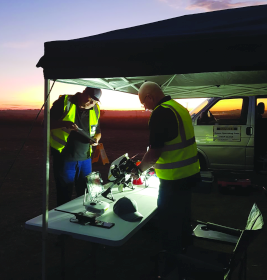

Drone Guards is moving into an untapped market of using unmanned aerial vehicles (UAVs) – also known as drones – to secure residential estates and other high-value assets such as mines, farms and commercial properties.
Drone Guards made its market debut at Securex SA 2019, which took place in May at the Gallagher Estate in Midrand. Securex focuses on all fundamentals of the security industry, from physical to cybersecurity, across both private and public sectors.
Drone Guards attended as the only drone operator exhibiting along with 190+ other exhibitors and over 7500 visitors.
Albertus van Zyl, Drone Guards MD, points out that there was interest from security companies, residential estate management as well as SOEs, however the most in-depth discussions over the three days were about securing residential estates and neighbourhoods.
Aerial security surveillance
Aerial surveillance technology has been proven globally to be one the most effective ways of protecting people and property. Using the latest technology in the unmanned aerial surveillance space, the Drone Guards service is effective in conjunction with existing security operations/systems on the ground, therefore creating a formidable deterrent to crime.
Deployment of the drone crew at locations can be covert or as part of a visible deterrent in day or night operations. Monitoring of live aerial surveillance footage in high definition, streamed to a control room, also enables visual identification of any potential crime which can then be pursued and foiled. Night operations or randomised perimeter patrols are customised depending on crime hot spots.
Making sense of the cost/benefit equation
Although the expectation in the market is that drones can be autonomously deployed and used for rapid response to crime situations, regulations in South Africa still dictate that drones are physically piloted by a certified individual. Depending on the operation, a minimum of a two-crew team e.g. drone pilot and an observer, is deployed to the site and must always be in control of the drone. This means that the use of a drone service is still relatively expensive because of the mandatory human intervention, and although highly desired, many residential estates may not be able to afford this service.
This is where Drone Guards makes a difference. The company has developed the ‘Neighbour Model’. This works on the principle of residential estates in close proximity to one another making use of shared and randomised shifts between the estates and in doing so, create a 7-days per week aerial surveillance line of defence. The costs of one drone crew are therefore shared between all the estates in the Neighbour Model. The benefits of aerial perimeter surveillance patrols as well as response to an incident at any of the estates are therefore realised.
Highly regulated environment
Remotely Piloted Aircraft Systems (RPAS) must be operated safely and within aviation regulations. Private drone owners are required to operate their drones under restrictive private-use rules, whereas commercial drone operators are highly regulated under Part 101 of the South African Civil Aviation Authority (SACAA) regulations and only once they have been issued with a Remote Operating Certificate (ROC).
The future of drones looks bright – cheaper and more autonomous drone operations seem to be the way to go. However, until the regulations have evolved to keep up with technology, it is companies like Drone Guards that will continue to augment security operations to combat crime.
Licensed, insured and authorised
Drone Guards operates as part of the UAV Aerial Works group of companies, and is licensed, insured, and authorised to operate over people, buildings and roads during daytime and night operations. Obtaining landowner permission, considering and mitigating privacy issues – specifically in residential estates – and securing permission to fly in controlled airspace safely are all part of Drone Guards’ expertise.
The Drone Guards management team has more than 50 years’ combined experience in aviation, with the head of flight operations having more than 5 000 military flying hours. Contact Drone Guards for a demonstration on your site or for more information on how your assets can be protected.
For more information contact Odyseusz Galazka, Drone Guards, +27 64 262 28894, [email protected], www.droneguards.co
| Email: | [email protected] |
| www: | www.droneguards.africa |
| Articles: | More information and articles about Drone Guards |

© Technews Publishing (Pty) Ltd. | All Rights Reserved.